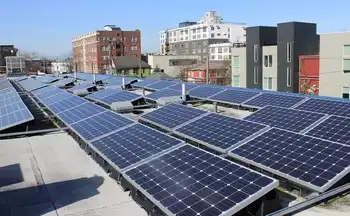Should tenants pay utilities separately?
ONTARIO - One of the big choices when it comes to looking for an apartment is whether to rent with utilities included or to pay separately.
Many older apartment buildings are bulk-metered which means the landlord pays the hydro for everyone and builds that into the rent. But many are now installing a type of smart meter in individual apartments that can measure when and how much electricity is being used by each unit. These so-called suite meters help tenants manage their energy consumption and better participate in OntarioÂ’s conservation efforts.
The question is whether itÂ’s a good idea or a bad one for tenants.
One reason to have a meter is that studies have shown that meters help tenants reduce their energy consumption by up to 23 per cent. But once you agree to pay for utilities, youÂ’re stuck with any energy increases, which are projected to rise more in the next few years than the permitted rent increases by your landlord. This is why most landlords prefer leases where the tenant is paying utilities directly.
The law regarding suite meters in Ontario has also changed. Many sitting tenants pay a bundled rent, which includes the utilities. If the landlord wants to change this to a suite meter, he must have the tenantÂ’s written consent. As well, the landlord must provide the following information:
• The amount of rent reduction and how it is calculated
• Information about the meter provider and the Ontario Energy Board
• The meter provider’s fees and charges including any planned increases
• The meter provider’s security deposit policy if required
• The disconnection policy if electricity costs payable by the tenants are overdue
• The energy efficiency of the refrigerator, if supplied by the landlords, to help tenants estimate their future energy costs.
The rent must then be reduced by the average amount of utilities used in the previous year.
A guiding principal is that the landlord takes the actual cost of the utilities for the previous 12 months, divides by 12 and then reduces the rent by that amount. In this way, a tenant can determine the potential savings going forward, before agreeing to the change. If the unit is vacant for any of the last 12 months, then a different calculation must be used to account for the fact that the utility costs for the vacant months would be less than if there was a tenant living there.
If you are a sitting tenant, you do not have to agree to the request to pay utilities directly. The landlord is allowed to install the suite meter in your unit, but will be responsible to pay the bill. However, if you decide, after seeing the rent reduction that you will receive, that you can save money by being more energy efficient, than it may be a good idea for you to consent to this change. Make sure that the landlord has also supplied energy efficient appliances as well.
For a new tenant, the landlord has to provide details about the energy usage for the unit for the prior 12 months as well as the electrical efficiency of the refrigerator, if it is being provided by the landlord. This will give the tenant a good idea as to what they will have to pay for electricity costs directly, before renting the unit.
Tenants will be able to apply to the Landlord and Tenant Board for remedies if the landlord has breached their obligations around consent, rent reductions, energy standards, or disclosure of information. Tenants are permitted to contact the Ontario Energy Board if they have a dispute with their energy supplier.
The landlord will have to give tenants 24 hoursÂ’ notice if the electricity supply will be interrupted as a result of the installation of the suite meter and will have to indicate how long the unit will be without electricity.
If a building contains 6 units or less, and there is only one meter for the building, all tenants can agree to pay their share of the total bill. The landlord must get the tenantsÂ’ agreement after giving them the utility bill for the building for the previous year and the method used to apportion part of that to each unit.
If a tenant wants to install an air conditioner in a unit where the rent that includes utilities, a landlord can require an additional sum related to these electricity charges, as long as it reflects the actual charge the landlord incurs.
Some landlords have tried to anticipate the new rules by having tenants sign leases prior to January 1, 2011 that stated that the tenant will agree to pay for the electricity charges directly if the landlord later installs a suite meter. These clauses will probably be deemed unenforceable and so the landlord will still have to provide all information noted above and obtain the tenantÂ’s written consent before separating the charges.
Related News

Report call for major changes to operation of Nova Scotia's power grid
HALIFAX - Nova Scotia is poised for a significant overhaul in how its electricity grid operates, following a government announcement that will strip the current electric utility of its grid access control. This move is part of a broader initiative to help the province achieve its ambitious energy objectives, including the cessation of coal usage by 2030.
The announcement came from Tory Rushton, the Minister of Natural Resources, who highlighted the recommendations from the Clean Electricity Task Force's report. The report suggests the creation of two distinct entities: an autonomous system operator for energy system planning and an independent body for…




